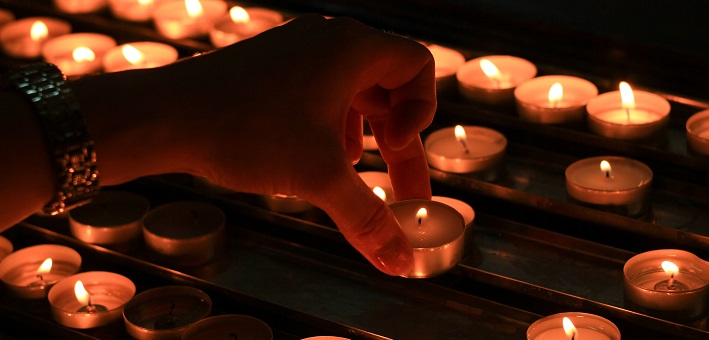Commentary on Romans 6:3-11
In Romans, Paul declares the good news that God restores and makes right people’s covenant relationships through Jesus Christ’s obedience (Romans 1:16-17; 3:21-26).1
In the middle section of the letter, he describes the shape of the new life that comes to those made righteous through Jesus’ faithfulness (Romans 5:1-11). As he does so, he interweaves three stories: a story of tragedy, a story of triumph, and a story of choice.
The first story is that of Adam’s disobedience. Because of Adam’s actions, sin enters the world and spreads its control over all people (Romans 5:12-14), ruling the world and bringing punishment. In its exercise of power or lordship, sin enslaves humanity (Romans 6:16-23). Its rule ends in death (Romans 5:14, 21; 6:23).
In contrast to this tragic story, Paul sketches the story of Jesus Christ’s triumph over sin and its consequence, death. Unlike Adam, Christ proves faithful and obedient to God, and his actions lead to grace, justification, and life (Romans 5:15-21). His obedience brings the free gift of restored relationship and righteousness (Romans 5:16-18), making possible a new dominion of grace that leads to eternal life (Romans 5:21).
Paul imagines some people might object to this argument. He has claimed that where sin multiplied, “grace abounded all the more” (Romans 5:20). Would his focus on the restored relationship with God that comes as the free gift of grace encourage people to keep on sinning so that grace might also increase (Romans 6:1-2)? To that question, Paul responds with an unequivocal “no!” He lays out his reasons in the complex argument that follows (Romans 6:3-11).
Paul’s third story, a story of choice, unfolds as his explanation of his emphatic response. This final story reveals the conflict which the contrasting stories of Adam and Christ create. Between them, Adam and Christ map out two opposing dominions — a dominion of death and a dominion of life — that stake opposing claims to humanity (Romans 5:17-21). But this story is not only about Adam or Christ. It is a story about Paul and his readers who now face a choice between two masters. The personal nature of this third story comes into focus with Paul’s striking shift of pronouns to the first-person plural (we, us, ours). This story, in short, is about us.
Paul begins by reminding us of what we have experienced in our baptism into Christ Jesus. This ritual act unites us with Christ so that we are co-participants in his death and resurrection (Romans 6:3). We now identify with Christ and become part of Christ’s dominion, acknowledging Christ as Lord (Romans 5:1, 11, 21). Baptism incorporates us into Christ’s rule as those who have died and been raised, just as Christ died and has been raised from the dead. Our baptism is the key moment of transition in which we leave behind our old lives when sin ruled over us. We begin a new life, the life that Christ experienced when God’s power raised him from the dead (Romans 6:4). We are people who can behave and conduct ourselves in a new way, no longer under sin’s control.
Baptism marks us as people of new life, because our old selves were crucified with Christ. Since we have died, our sinful body is powerless and inoperable (Romans 6:6). We are no longer sin’s slaves but are free from its control and claims over us (Romans 6:7).
Once Paul has explained the implications of our participation in Christ’s death, he turns his attention to his resurrection. Here the argument is more nuanced, because while our participation in resurrection is real, it is not yet complete. Even though we are now living a new life, we do not yet experience the fullness of resurrection. Paul’s contrasting tenses make that distinction clear. Our being united with Christ’s death is a completed action, while resurrection remains a future certainty (Romans 6:5). We who have died with Christ “will also live with him” (Romans 6:8). We too will be raised. Our destiny is clear.
But our participation in Christ’s resurrection is not simply a future hope. It changes our present lives as well. To make this point, Paul again underscores what Christ’s resurrection means. As the Risen One, Christ is free from death’s dominion, so death no longer has any control over him (Romans 6:9). His death, once for all time, was a death to sin. But that is in the past. In the present, and for all time to come, Christ lives to God (Romans 6:10).
In the same way, we must reckon or consider that we are “dead to sin and alive to God” (Romans 6:11). That understanding constitutes a choice in the way we understand ourselves and the power that rules over us. That choice is the first step of our response to our ongoing struggle with sin’s power.
Paul will develop his discussion of that fight against sin’s control more fully in the balance of Romans 6-8. But his first step, taken in the words of Romans 6:3-11, is to make clear what God has done through Christ.
As is often the case with Paul, the indicative precedes the imperative. Paul first reminds us of what God in grace has done. Only then does he turn to encourage us to act in faith on the basis of God’s gift. Paul is no moralist who commands us to pull up our bootstraps. Rather he grounds what we must do in what God has already done, assured that God’s power is now available to us.
Here Paul reminds us of the centrality of Christ’s death and resurrection. He assures us that baptism joins us to Christ in a profound and lasting way so that we are co-participants in that death and resurrection. Knowing that, in this Easter season, we too find our own identities transformed, our paths straightened, our lives new. Thanks be to God.
Note
- Commentary first published on this site on April 20, 2019.


April 8, 2023